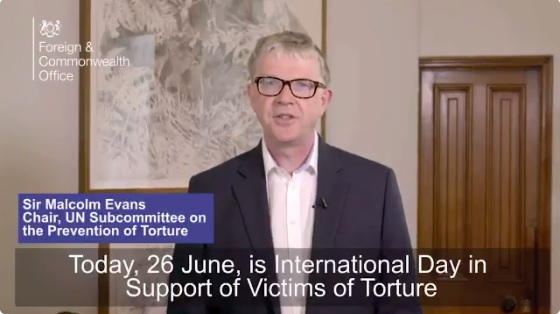GENEVA (23 June 2017) – At a time when the absolute prohibition of torture is often challenged in the name of national security across the globe, a group of UN human rights experts* strongly reaffirms that the practice of torture is a severe violation of human rights and call on States to eradicate the conditions and circumstances conducive to its practice.
To mark the International Day for the Victims of Torture on 26 June, the UN experts highlight that prohibition of torture is ‘absolute’ and can never be justified under any circumstances.
“The absolute prohibition of torture and other cruel, inhuman or degrading treatment or punishment may well constitute the most fundamental achievement in the history of mankind,” said the UN Special Rapporteur on Torture, Nils Melzer. “Any tolerance or acquiescence concerning such practices, however exceptional and well argued, will inevitably lead down a slippery slope towards complete arbitrariness and brute force, in disgrace for all of humanity."
The experts highlighted that the right to be free from torture cannot be lifted by States under any circumstances, and noted that its use destroys the fundamental human dignity not only of the victims, but also of the perpetrators.
"Torture destroys lives and is one of the most brutal human rights violations,” said Jens Modvig, who chairs the UN Committee against Torture. “States should be reminded that no exceptional circumstances whatsoever may be invoked to justify acts of torture. The absolute character of the prohibition against torture applies in any case, including in the context of fighting terrorism.”
The experts said each State had a responsibility to act, using international conventions and protocols which were already in place.
“Upholding the absolute prohibition of torture must be a priority for all States. However, not all States condemn it as adamantly as they should. States must adopt effective measures to prevent acts of torture. The system created by the Convention against Torture and its Optional Protocol provides powerful means for doing so; therefore we encourage all States to ratify these instruments," said Sir Malcolm Evans, Chairperson of the Subcommittee on prevention of torture.
In addition to the requirement to prohibit torture, the experts also reminded States of the devastating consequences of torture and of their obligations to provide redress and rehabilitation to the victims.
The Chair of the UN Voluntary Fund for Victims of Torture, Gaby Oré Aguilar, highlighted: “States are obliged to ensure that the absolute prohibition of torture is fully enforced. It is equally important that States observe their obligation to provide effective and prompt redress and rehabilitation to victims of torture and their families by making available the urgently needed resources to respond to the plight of thousands of torture victims around the world.”
Ending torture requires a renewed commitment from every UN Member State to eradicate the conditions and circumstances conducive to its practice, the experts stressed. Every country must incorporate legal safeguards into domestic laws to prevent these conditions from arising, and to put the rights of the victims to redress and rehabilitation at the centre of these efforts.
